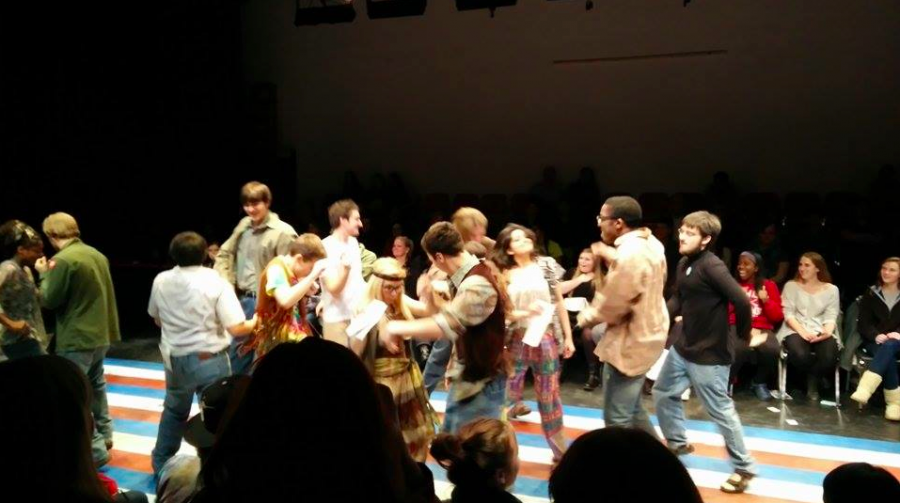“Vietnam 101: The War on Campus” provides insight into a confusing time
Central’s Drama Department and Director Christine Hicks put on a performance of Vietnam 101: The War on Campus the weekend of Nov. 13. The play is a series of monologues and scenes in which students from Oberlin College in the mid 60s and early 70s describe their experience with the Vietnam War, their dissension for it, and how their students protests ultimately led to the Kent State shooting on May 4, 1970, in which four students were killed.
Hicks’ production showed the confusion of the time period as well as the multitude of opinions that both students and their government had in support or opposition of the war. Inter spliced between dramatic dialogues and demonstrations were showings of the young men and women developing as adults, from choosing their majors, to their opinions on civil rights, to panty raids of the female dorms.
A black box theater setup and minimal special effects made the performance emotionally intimate, as the audience (seated onstage) interacted with almost every laugh, and some audience members literally shed tears during the darker scenes.
“It went a lot better than a lot of us expected,” said Kaelyn Reichmann, senior actor. “We had so much positive energy from the audience. We got laughs when we didn’t expect them.”
Members of the audience enjoyed the show as well.
“It was educational from a historic stance and overall a pretty good play,” said Jasper Brown, junior.
Structure in the play was loose. Scenes shifted randomly, from comic relief to dark dissension. The subject matter of the scenes and the characters in them also shifted quickly, covering civil rights, women’s rights, psychedelic rock, and other topics. The only thing truly tying them together was chronological order, documented with projectors that showed historical images of the various demonstrations and news reports from the Oberlin review and radio stations.
The structure made it hard to feel emotionally attached to any one character, other than sophomore Evan Donaldson’s character, who served as undecided, self-pitying comic relief. Taking on a documentary style, the play was very educational and historically accurate, but there was little rising action or emotional development that made me, as an audience member, grab hold to any one character.
The play succeeded in showing the audience how confused and action packed the time period was. The play tried to be holistically encompassing of the social scene that, at that time, was intermixed with the scenes revolving around the Vietnam War, and I believe they succeeded as multiple perspectives were given, and most prominent aspects of life during that time were shown in one way or another.
Central’s production did vary from how the play is traditionally preformed; the ending was changed.
“We cut and pasted so much of the script,” Reichmann said. “There were a lot of parts [in which] lines were being repeated for the general idea of it. The epilogue that you saw there, the final candle requiem, instead, the [written] end of the show has them in positions from the opening, acting as if they’re giving interviews long after the fact. We wanted to actually remember them and to remember that real people died and were hurt and had to go through insane situations.We [also] had to cut large ensemble lines. One person said one line, but there were more lines than people, so we couldn’t do all of them.”
I thought the ending was very smooth and emotionally fulfilling and truly reflected the confusion of the situation. I did not feel the traditional ending was needed, and I left satisfied.
Technically, the crew made no noticeable errors, and the production ran smoothly. The previous dress rehearsals allowed them to fix the bugs before opening night.
“I think the show went off without a hitch,” said Will Girard, junior and left stage hand. “I think the dress rehearsals all went very well and made a lot of improvements. Everyone was at the right spot at the right time, with chairs.”
“We wanted to show that no matter how stressful things can seem at times, especially for idealistic young people, there is power in determination, and even college students can change the world and can make things better,” Reichmann said. “There is hope for change.”













